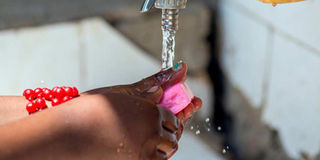How to protect yourself against coronavirus

Experts say for viral infections including the common cold, the most effective way to protect yourself is regular hand-washing with warm water and soap. Net Photo
Although the number of confirmed coronavirus infections has increased, health officials are assured that timely measures and preventive action will limit the impact of the outbreak. According to the Ministry of Health, the virus has since been reported in 24 other countries although no cases have been confirmed in Africa.
Emmanuel Ainebyoona, the Ministry of Health spokesperson, says the Uganda Virus Institute is well equipped to detect, maintain and manage any outbreak. Although Ainebyoona says there is no cause for alarm yet, it is advisable for all of us to take precautionary hygienic measures, to make it impossible for transmission from unidentified patients to occur.
The world Health Organisation (WHO), urges everyone to practice respiratory hygiene. Health experts recommend covering your mouth and nose when you cough and sneeze. They further recommend maintaining at least a one metre distance between yourself and other people, particularly those who are coughing, sneezing or have a fever.
Hand washing
Dr Moses Semulya, a general practitioner at Le Memorial Hospital in Kigo, recommends careful washing of hands.
“Our hands touch a number of surfaces everyday some of which might have a variety of germs and bacteria. To prevent transferring these germs and bacteria to your eyes, nose or mouth, wash your hands frequently and properly,” he remarks.
Sanitiser
He also recommends using an alcohol-based hand sanitiser or antibacterial products such as hand sanitisers, wipes or tissues.
“Remember to wipe your hands after touching any doorknobs, door handles, escalator/elevator handrails and computer keyboards, especially those shared by different people. Also clean your hands after using the ATM machine or the menus in a restaurant, among others,” he recommends.
It is also advisable to minimise contact with other people. For example, avoid shaking hands as a form of greeting.
Boosting immunity
You need to keep your body strong in order to fight an infection. Vitamins and nutritional supplements can help enhance the immunity of the body thus enabling it to fight basic viruses and bacteria with ease. Even if the immune system might not be able to eliminate the virus or bacteria completely, it can help medications work efficiently.
Face masks
Another preventive measure is wearing a facemask. According to Nancy Kiteme, a pharmacist, masks can help to prevent airborne illnesses including coronavirus.
“A face mask prevents liquids of another infected person’s sneeze or cough from entering your mouth or nose. Wearing one can protect you from getting infected and spreading your illness to someone else. Face masks can also help prevent hand-to-mouth viral transmissions, because you will not be able to touch your own mouth while wearing one,” she explains.
These masks, however, are not designed to block tiny particles from the air and they therefore cannot block airborne viruses from entering your body. A face mask costs as little as Shs500.
If you have no access to a mask, Kiteme says a wrapping a clean scarf or other cotton fibre around your nose and mouth can also work.




